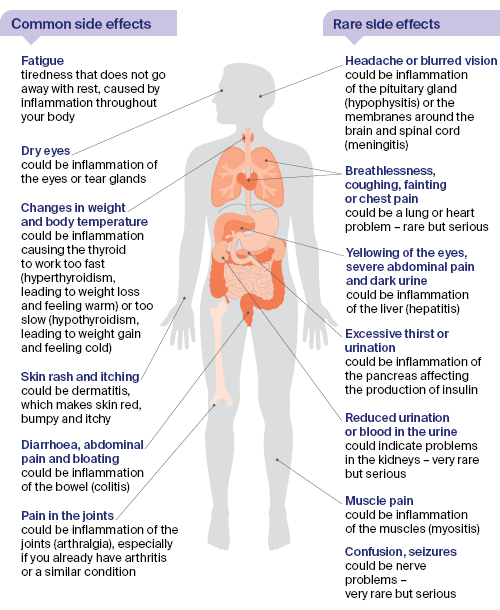- Home
- About Cancer
- Cancer treatment
- Immunotherapy
- Side effects of immunotherapy
Side effects of immunotherapy
Like all treatments, immunotherapy with checkpoint inhibitors can cause side effects. These are sometimes called immune-related adverse effects (IRAEs).
Immunotherapy side effects are different to the side effects of other cancer treatments and need to be managed differently. This diagram shows some possible side effects of immunotherapy, but you are unlikely to have all of the side effects shown.
Learn more about:
When to expect side effects
You may have side effects within days of starting treatment, but more commonly they occur several weeks or months after starting treatment. In some rare cases, new side effects can appear months after finishing treatment.
Most people have mild side effects. Side effects are likely to be more severe if you are having higher doses or a combination of immunotherapy drugs, or if you are having immunotherapy with other cancer treatments.
Let your treatment team know about any over-the-counter medicines or natural therapies you are thinking about using. Some may affect how the immunotherapy works or make side effects worse.
Common and rare side effects of immunotherapy
Checkpoint inhibitors trigger an immune response that can lead to redness, swelling or pain (inflammation) anywhere in the body. Side effects will depend on which part of the body becomes inflamed. The diagram below shows examples of common and rare side effects. The side effects you have will depend on the drug and how your body responds. While some people have serious side effects, others have just one or two mild side effects.

Other rare side effects can occur, and some side effects can be life-threatening. Let your treatment team know about any new or worsening side effects during or after treatment. Do not try to treat side effects yourself. Most immunotherapy side effects can be managed and reversed if they are reported early.
Podcast: Immunotherapy and Targeted Therapy
Listen now
More resources
Dr Jenny Lee, Medical Oncologist, Chris O’Brien Lifehouse, NSW; Prof Michael Boyer, Medical Oncologist and Chief Clinical Officer, Lung and Thoracic Cancer, Chris O’Brien Lifehouse, and Central Clinical School, The University of Sydney, NSW; A/Prof Christine Carrington, Senior Consultant Pharmacist Cancer Services, Princess Alexandra Hospital, QLD; Dr Inês Pires da Silva, Medical Oncology Fellow, Melanoma Institute Australia and Westmead and Blacktown hospitals, NSW; Sandra Donaldson, 13 11 20 Consultant, Cancer Council WA; Sherry Gilbert, Consumer; Marilyn Nelson, Consumer; Julie Teraci, Skin and Melanoma Cancer Nurse Coordinator, WA Cancer and Palliative Care Network, North Metropolitan Health Service, WA; Helen Westman, Lung Cancer Nurse Coordinator, Cancer and Palliative Care Network, Royal North Shore Hospital, NSW.
View the Cancer Council NSW editorial policy.
View all publications or call 13 11 20 for free printed copies.
Need to talk?
Support services
Coping with cancer?
Ask a health professional or someone who’s been there, or find a support group or forum
Need legal and financial assistance?
Pro bono legal and financial matters, no interest loans or help with small business
Cancer information
Managing cancer side effects
Learn more about the range of side effects cancer can cause, and how to manage these
Other cancer treatments
Learn more about other cancer treatments, such as chemotherapy, radiation therapy, surgery and targeted therapy

